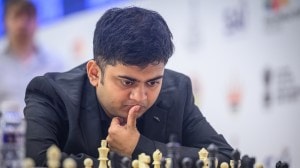Finally, Lanka to enshrine IPKF, says it fought terrorism
Sri Lanka will finally mitigate some of the anger that continues to simmer in the Indian Army over its humiliating withdrawal from the islan...

Sri Lanka will finally mitigate some of the anger that continues to simmer in the Indian Army over its humiliating withdrawal from the island nation 14 years ago, when it lays a foundation stone for a memorial to the Indian Peace-Keeping Forces (IPKF) in Colombo next month.
The memorial to the IPKF is a unique example of how otherwise warring political parties in Sri Lanka such as Prime Minister Ranil Wickeramasinghe’s UNP and President Chandrika Kumaratunga’s SLFP, have agreed to ‘‘cohabit’’ to provide both land and funds, respectively, to honour the brave Indian soldier, who gave up his life to fight terrorism in a foreign country.
Every one of the 1155 soldiers who died in ‘‘Operation Pawan,’’ the codename given to the IPKF’s battle against the LTTE from 1987-90, will have their names inscribed on the memorial likely to be built next to the World War II cemetery in Colombo.
‘‘The memorial is a long overdue recognition of the honourable role the Indian soldier has played in fighting another nation’s terrorism,’’ said General (Retd) Ashok Mehta, a much-decorated soldier who was the IPKF’s GOC-in-C, South, during ‘Op Pawan.’
Sri Lankan Chief of Defence Staff and army chief Lionel Balagalle, said to be the motivating force behind the memorial, sent a team from Colombo to New Delhi a couple of weeks ago to finalise the idea.
The Sri Lankan team took back with them three designs conceptualised by the Indian Army’s engineers for the memorial.
IPKF veterans are likely to be invited for the foundation stone-laying ceremony in Colombo in April.
Clearly, the decision to build the IPKF memorial is also based on hard-nosed realpolitik.
A Sri Lankan team who came to work on the nuts and bolts of a prospective defence cooperation pact with India in January realised it would considerably mitigate the resentment within the Indian army if such a memorial was built.
Indian Army sources said they never pushed in any way the idea with Colombo, pointing out that ‘‘the rethinking’’ on the IPKF’s role in Sri Lanka is at least as old as three years and first came up during the time of ex-chief Rohan Dalawatte.
IPKF veterans pointed out that it was exactly 14 years ago to the month when Sri Lankan president Premadasa and then Prime Minister V P Singh agreed that the IPKF should come back home ‘‘under the most humiliating conditions.’’
‘‘Not only were we forced to fight the LTTE with one hand tied behind our backs,’’ one veteran said, remembering the games Sri Lankan politicians like Premadasa played with the IPKF, ‘‘but we were also prevented from finishing our task.’’ A year later, Rajiv Gandhi was assassinated by an LTTE suicide bomber.
Ordered by VP Singh to return home without any acknowledgement of the IPKF’s role, Indian soldiers landed in Madras in March 1990 to find then DMK chief minister Karunanidhi describing them as the ‘Indian Tamil Killing Force.’ Army circles in Delhi now point out that Bangladesh, where four times as many Indian soldiers died during the 1971 war as compared to Sri Lanka, could ‘‘now easily take a leaf’’ out of Colombo’s book.
Photos



- 01
- 02
- 03
- 04
- 05




























